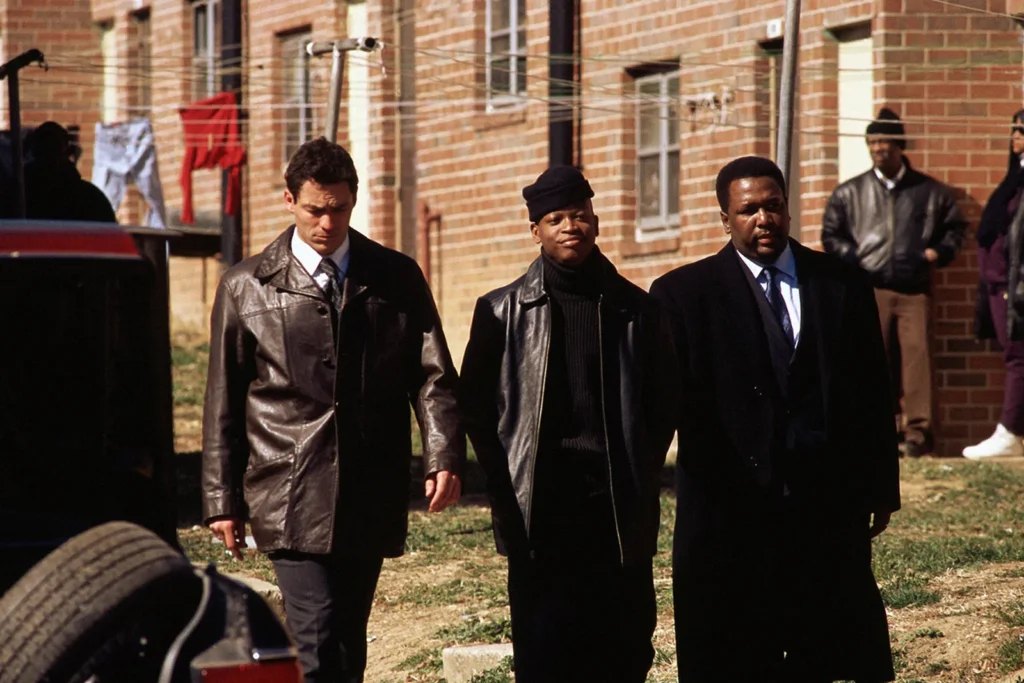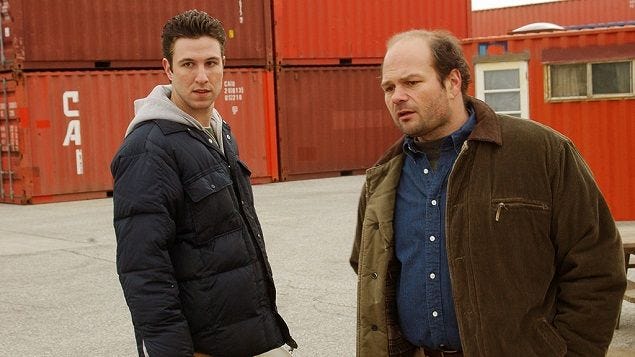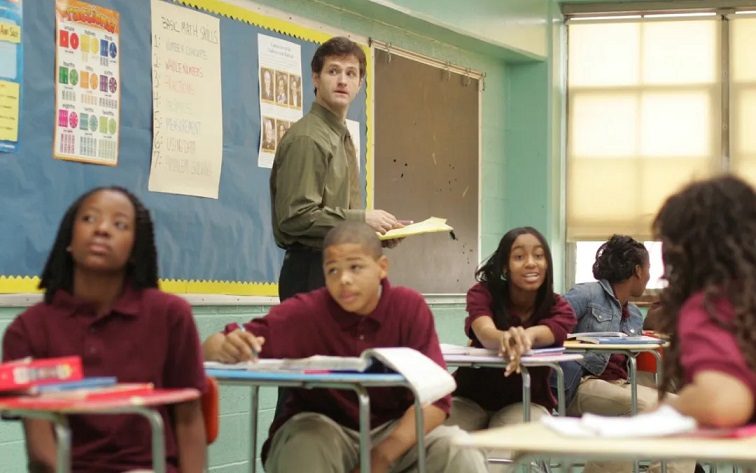
When does The Wire get good?
The average fan of The Wire believes it takes half of the first season (about five episodes) to get in a rhythm with the pacing and characters of the show. Many fans say this is only true for first-time viewers of the show, and many expressed that with rewatches of the show, fans will have an appreciation for every episode starting with the first one.
Fans of the show also often comment that the second season feels like a stark shift in theme for the show, but most comment that the second season becomes a fan-favorite upon rewatches of the series.
Most people argue that the fifth season of the show is its weakest, with the plotline “jumping the shark” a bit, but argue that it is still important to view the series to completion in order to appreciate the overall message the show shares with viewers.
What Fans Say:
—
—
Fans of The Wire often praise its realistic portrayal of urban life, especially the layered exploration of Baltimore’s criminal underworld and law enforcement. They admire the show’s commitment to authenticity, with characters that feel real and complex, flawed yet relatable. The writing is often described as smart and deeply nuanced, pushing viewers to think critically about social issues like poverty, education, and institutional corruption. Fans also highlight that the show builds its impact over time, rewarding viewers with rich payoffs as the story unfolds.
What Haters Say:
Critics of The Wire typically cite its slow pacing, especially in early episodes, which can feel overwhelming or tedious. The realistic style, with its focus on detail and the lack of traditional “action” or big twists, can make the series feel less engaging initially. Some viewers find the extensive cast difficult to keep track of and are put off by the bleak tone and the show’s lack of conventional resolution. For these reasons, newcomers sometimes struggle to get hooked early on.
Does The Wire Fall Off At All?
There is fairly universal understanding that the fifth season of The Wire is the show’s weakest. After four straight seasons of the show building on top of strong narrative and intertwining plot themes, the fifth season gets a little ridiculous for some viewers. There is no argument to not finish the series at this point, and many people still find the fifth season enjoyable, if not a little over-the-top.
Aggregated Critic Commentary:
| Season | Rotten Tomatoes Rating | IMDb Rating |
|---|---|---|
| Season 1 | 86% | 8.8 |
| Season 2 | 100% | 8.6 |
| Season 3 | 100% | 9.2 |
| Season 4 | 100% | 9.7 |
| Season 5 | 93% | 9.1 |
Season 1 received a solid start with an 86% rating on Rotten Tomatoes and a favorable score of 8.8 on IMDb, showcasing the show’s initial build-up phase. From Season 2 onwards, critics widely praised the show, leading to perfect scores on Rotten Tomatoes for Seasons 2-4, reflecting the show’s intricate narrative depth and character development. Season 5 concluded the series strongly, with a 93% Rotten Tomatoes score and an IMDb rating of 9.1, marking it as one of the most acclaimed television dramas of all time.
The Wire has been celebrated by critics as one of the best television dramas of all time, lauded for its ambitious storytelling and groundbreaking approach to social commentary. Critics have praised creator David Simon for using The Wire to examine the interconnected systems of power and failure within American cities. While initial reviews of early episodes were mixed due to its dense storytelling, later seasons saw near-universal acclaim as the show developed a reputation for tackling complex themes rarely addressed in television. Many critics regard The Wire as a high-water mark for television drama, highlighting it as an artful and relevant exploration of societal issues.
Overview of The Wire:
The Wire, created by David Simon, debuted on HBO in 2002 and ran for five seasons, wrapping up in 2008. Set in Baltimore, Maryland, the series unfolds in a world where law enforcement, street-level crime, politics, education, and journalism intersect. Rather than focusing on a single protagonist, The Wire takes a unique ensemble approach, weaving together stories from both sides of the law to explore the interconnected nature of various societal institutions.
Each season of The Wire tackles a different aspect of Baltimore’s ecosystem: the illegal drug trade, the city’s working-class ports, the public school system, local government and bureaucracy, and the media. The narrative style, rooted in realism, immerses viewers in a complex web of characters and institutions, offering a powerful critique of systemic issues that resonate far beyond Baltimore. Known for its intricate plotlines and morally ambiguous characters, The Wire reveals a city in perpetual struggle, where victories are often Pyrrhic, and the line between hero and villain is blurred.
Critics and fans alike have celebrated The Wire for pushing the boundaries of TV storytelling. Its commitment to authenticity, coupled with detailed portrayals of urban life, has earned it an almost mythic status in television history. Even years after its finale, The Wire remains a cultural touchstone, referenced and revered by fans who see it as more than entertainment—a mirror to societal issues that are still prevalent today.
Season-by-Season Breakdown:
Season 1: The Drug Trade
The first season of The Wire introduces viewers to Baltimore’s Westside drug trade through the eyes of the police, led by Detective Jimmy McNulty, and the Barksdale Organization, a powerful drug empire. With a focus on the cat-and-mouse game between cops and criminals, this season provides a gritty look at the daily grind of police work and the inner workings of drug gangs. The “wire” in The Wire refers to the listening devices set up by the police to monitor drug lords. Though the pace can feel slow, the payoff comes as viewers start to understand the motivations and humanity of each character.
Season 2: The Docks and the Working Class

In a pivot from street crime, the second season explores the Baltimore docks, focusing on the struggles of blue-collar workers involved in smuggling and unions. It’s a season about economic hardship and the decline of American industry, spotlighting characters like union leader Frank Sobotka. While initially polarizing due to the change in focus, Season 2 is now appreciated for its deep dive into Baltimore’s working class and the economic challenges they face, further enriching the show’s depiction of systemic problems.
Season 3: The Game Changes, Local Politics
Returning to the streets, Season 3 delves deeper into the drug trade, examining the failed attempts at reform from both criminals and the police. The introduction of the “Hamsterdam” experiment—a controversial attempt to legalize drugs in designated zones—stands as one of the show’s most thought-provoking arcs. It raises ethical and societal questions, making it one of the show’s most compelling seasons. Meanwhile, the storyline of Avon Barksdale and his former ally Stringer Bell continues, as they grapple with the shifting dynamics of their empire.
Season 4: The School System

Widely regarded as the series’ best, Season 4 shifts focus to Baltimore’s public schools, following a group of middle schoolers as they navigate a troubled education system. This season sheds light on how systemic issues affect children, often forcing them into difficult choices at a young age. The teachers, administrators, and students face daunting challenges, revealing how the school system can trap young people in cycles of poverty and violence. Season 4 is both heart-wrenching and powerful, showing the far-reaching impact of broken institutions on future generations.
Season 5: The Media
The final season critiques the role of the media in shaping public perception, following the journalists at the fictional Baltimore Sun. In exploring how the press reports on crime and corruption, the season examines the impact of sensationalism, budget cuts, and the quest for journalistic integrity. While some fans found Season 5’s narrative less engaging, it offers a sobering look at how the media influences—and sometimes fails to address—critical societal issues.
Similar Shows to The Wire:
- The Sopranos
- Breaking Bad
- Mad Men
- Oz
- True Detective
If You Liked These, You’ll Like “The Wire“:
- Treme – Another David Simon series, examining New Orleans post-Katrina.
- Boardwalk Empire – Set in the 1920s, offering a historical perspective on crime and corruption.
- Homicide: Life on the Street – Predecessor to The Wire, also based in Baltimore.
- Sons of Anarchy – A gritty look at an outlaw biker gang with complex moral undertones.